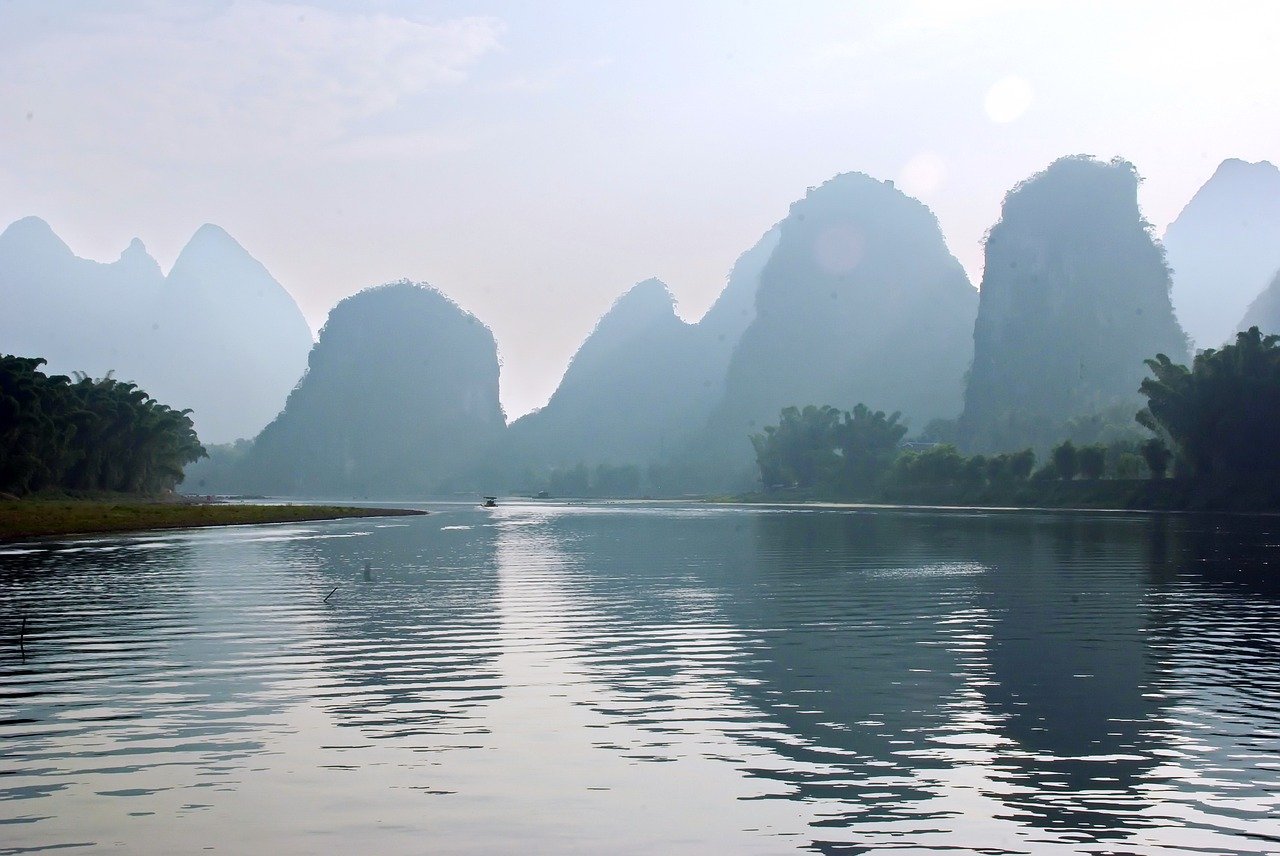Image Credit: DEZALB on Pixabay
In this post we’ll learn some Chinese vocabulary and expressions that you can use to talk about the natural world.
花、树、草和新鲜空气 huā, shù, cǎo hé xīnxiān kōngqì Flowers, Trees, Grass, and Fresh Air
Let’s start with some basics of nature that you can find around you even if most of the nature you see is in a park: 一颗树 yì kē shù (a tree), 一朵花 yì duǒ huā (a flower), 一个花园 yí gè huāyuán (a garden), 草 cǎo (grass), 一个植物 yí gè zhíwù (a plant), 一个湖 yí gè hú (a lake), 一个池塘 yí gè chítáng (a pond), 一条小路 yì tiáo xiǎolù (a path), 树林 shùlín (woods). You’re probably not going to see much wildlife in a park, but if you’d like to know how to talk about the animals you do see, check out this post.
- 公园里有很多树。
Gōngyuán lǐ yǒu hěnduōshù.
There are lots of trees in the park. - 看那朵漂亮的花。
Kàn nà duǒ piàoliàng de huā.
Look at that beautiful flower.
- 我们坐在草地上吧。
Wǒmen zuò zài cǎodì shàng ba.
Let’s sit in the grass. - 我们坐在花园旁边的长凳上吧。
Wǒmen zuòzài huāyuán pángbiān de chángdèng shàng ba.
Let’s sit on the bench next to the garden. - 树林里有一条小路。
Shùlín lǐ yǒu yì tiáo xiǎolù.
There’s a path through the woods. - 我们绕着池塘走一走吧。
Wǒmen rào zhe chítáng zǒu yì zǒu ba.
Let’s walk around the pond. - 这个湖里有鱼吗?
Zhège hú lǐ yǒu yú ma?
Are there fish in this lake? - 湖是浅的还是深的?
Hú shì qiǎn de háishì shēn de?
Is the lake shallow or deep?
树木和植物 shùmù hé zhíwù Trees and Plants
No matter where we are, there’s usually some kind of plant life around us, even if it’s in a pot in the corner of your office: 室内植物 shìnèi zhíwù (houseplant), 花盆 huāpén (flowerpot), 玫瑰 méiguī (rose), 刺 cì (thorn), 土壤 tǔrǎng (soil), 叶子 yèzi (leaf), 橡子 xiàngzi (acorn), 茎 jīng (stem), 种子 zhǒngzi (seed), 坚果 jiānguǒ (nut), 给植物浇水 gěi zhíwù jiāoshuǐ (to water a plant), 种下种子 zòng xià zhǒngzi (to plant a seed), 开花;花开 kāihuā, huā kāi (to bloom; flowers bloom), 生长;植物生长 shēngzhǎng, zhíwù shēngzhǎng (to grow; plants grow).
- 我要给我的植物浇水。
Wǒ yào gěi wǒ de zhíwù jiāoshuǐ.
I need to water my plants. - 我们有很多室内植物。
Wǒmen yǒu hěnduōshìnèi zhíwù.
We have a lot of houseplants. - 那是一个漂亮的花盆。
Nà shì yí ge piàoliàng de huāpén.
That’s a beautiful flowerpot. - 那株植物的叶子正在变褐色。
Nàzhū zhíwù de yèzi zhèngzài biàn hèsè.
That plant’s leaves are turning brown. - 橡子从树上掉下来。
Xiàngzi cóng shù shàng diào xià lái.
Acorns are falling from the tree. - 玫瑰的茎上有刺。
Méiguīde jīng shàng yǒu cì.
Roses have thorns on their stems. - 那棵树是枫树还是橡树?
Nàkēshù shì fēngshù háishì xiàngshù?
Is that tree a maple or an oak? - 冬天的松树是绿色的。
Dōngtiān de sōngshù shì lǜsè de.
Pine trees are green in the winter. - 我在花园里种了番茄种子。
Wǒ zài huāyuán lǐ zòngle fānqié zhǒngzi.
I planted tomato seeds in the garden. - 花在春天开花。
Huā zài chūntiān kāihuā.
The flowers bloom in the spring. - 你花园里的植物长得很快。
Nǐhuāyuán lǐde zhíwù zhǎng de hěnkuài.
The plants in your garden are growing quickly.
丘陵、河 和山谷 qiūlíng,hé hé shāngǔ Hills, Rivers, and Valleys
Let’s add some more nature vocabulary: 丘陵 qiūlíng (hill), 山谷 shāngǔ (valley), 河 hé (river), 小溪 xiǎoxī (stream), 瀑布 pùbù (waterfall); 田野 tiányě (field), 草地 cǎodì (meadow), 石头 shítóu (rock), 巨石 jùshí (boulder), 沼泽 zhǎozé (swamp).
- 我们的房子在山上。
Wǒmen de fángzi zài shān shàng.
Our house is on a hill. - 我们住在一条河边。
Wǒmen zhù zài yì tiáo hé biān.
We live next to a river. - 这条河在这里流得很快。
Zhètiáohé zài zhèlǐ liú de hěnkuài.
The river runs quickly here. - 附近有一个漂亮的瀑布。
Fùjìn yǒu yí ge piàoliàng de pùbù.
There’s a beautiful waterfall nearby. - 山谷里有很多农场。
Shāngǔ lǐ yǒu hěnduō nóngchǎng.
There are a lot of farms in the valley. - 我们家附近的树林里有一条小溪。
Wǒmenjiā fùjìn de shùlín lǐ yǒu yì tiáo xiǎoxī.
There is a little stream in the woods near our house. - 我们穿过田野。
Wǒmen chuānguò tiányě.
We walked across the field. - 草地上有漂亮的野花。
Cǎodì shàng yǒu piàoliàng de yěhuā.
There are beautiful wild flowers in the meadow. - 山坡上有很多石头和巨石。
Shānpō shàng yǒu hěnduōshítóu hé jùshí.
There are a lot of rocks and boulders on the hillside. - 这条路穿过沼泽。
Zhètiáolù chuānguò zhǎozé.
This road goes through a swamp.
山和森林 shān hé sēnlín Mountains and Forests
If you ever get to the mountains, you may need to say: 一座山 yí zuò shān (a mountain); 山脉 shānmài (a mountain range); 山顶 shāndǐng (the summit of the mountain); 爬山 páshān (to hike in the mountains); 登山 dēngshān (to climb a mountain); 顶峰 dǐngfēng (a peak); 悬崖 xuányá (a cliff); 一片森林 yí piàn sēnlín (a forest); 在森林里露营 zài sēnlín lǐ lùyíng (to camp in the forest); 松树 sōngshù (pine trees); 枫树 fēngshù (maple trees); 橡树 xiàngshù (oak trees); 桦树 huàshù (birch trees); 野生动物 yěshēng dòngwù (wild animals).
- 这个国家有两条山脉。
Zhè ge guójiā yǒu liǎngtiáo shānmài.
There are two mountain ranges in this country. - 我们可以从窗户看到漂亮的山脉。
Wǒmen kěyǐ cóngchuānghù kàndào piàoliàng de shānmài.
We can see beautiful mountains from our window. - 这座山的顶峰有多高?
Zhè zuò shān de dǐngfēng yǒu duō gāo?
How high is the summit of this mountain? - 山的顶峰被雪覆盖。
Shān de dǐngfēng bèi xuěfùgài.
The mountain peaks are covered in snow. - 这些悬崖有多高?
Zhè xiē xuányá yǒu duō gāo?
How high are those cliffs? - 我喜欢在森林里露营。
Wǒ xǐhuān zài sēnlín lǐ lùyíng.
I like to camp in the forest. - 这片森林里有松树/枫树/桦树/橡树。
Zhè piàn sēnlín lǐyǒu sōngshù/fēngshù/huàshù/xiàngshù.
There are pine trees/maple trees/birch trees/oak trees in this forest. - 这片森林里有野生动物吗?
Zhè piàn sēnlín lǐ yǒu yěshēng dòngwù ma?
Are there wild animals in this forest?
世界 shìjiè The World
Let’s finish with some geographical terms that you can use to talk about the natural world. 大陆 dàlù (continent), 海洋 hǎiyáng (ocean), 海 hǎi (sea), 湾 wān (bay), 海岸 hǎiàn (coast), 岛 dǎo (island), 半岛 bàndǎo (peninsula), 沙漠 shāmò (desert), 丛林 cónglín (jungle), 冰川 bīngchuān (glacier), 冰山 bīngshān (iceberg), 北极/南极 běijí/nánjí (north/south pole), 北,南,东,西 běi, nán, dōng, xī (north/south/east/west).
- 有多少个大陆?
Yǒu duōshǎo ge dàlù?
How many continents are there? - 海洋又宽又深。
Hǎiyáng yòu kuān yòu shēn.
The ocean is wide and deep. - 我喜欢在海里游泳。
Wǒ xǐhuān zàihǎi lǐ yóuyǒng.
I love swimming in the sea. - 这条河汇入一个大海湾。
Zhètiáohé huìrù yí ge dàhǎiwān.
The river empties into a big bay. - 我们沿着海岸开车。
Wǒmen yánzhe hǎiàn kāichē.
We drove along the coast. - 你要搭渡轮才能上岛。
Nǐyào dā dùlún cái néng shàngdǎo.
You have to take a ferry to get to the island. - 沙漠又热又干。
Shāmò yòu rè yòu gàn.
The desert is hot and dry. - 许多不同的植物和动物生活在丛林中。
Xǔdu bùtóng de zhíwù hé dòngwù shēnghuó zàicónglín zhōng.
Many different plants and animals live in the jungle. - 冰川越来越小。
Bīngchuān yuè lái yuè xiǎo.
The glaciers are getting smaller and smaller. - 北极/南极附近的海洋有冰山。
Běijí/Nánjí fùjìn de hǎiyáng yǒu bīngshān.
There are icebergs in the ocean near the north/south pole. - 太阳从东边升起,从西边落下。
Tàiyáng cóng dōngbiān shēngqǐ,cóng xībiān luòxià.
The sun rises in the east and sets in the west.
Do you want to learn Chinese?
Check out our other posts on Chinese language, culture, and more. And if you’re looking for convenient and affordable live Chinese lessons with a real teacher, check out The Language Garage. Our lessons are given online in a virtual classroom, so it doesn’t matter where you live or work – we can come to you. And we have flexible options, with a free trial so that you can decide if there’s a fit. Check us out!





